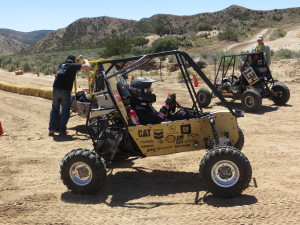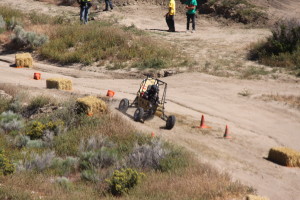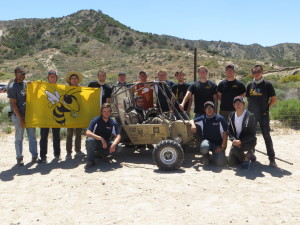Metlab is an active supporter of many university educational programs featuring race car construction. This year Metlab provided expertise and heat-treating services for Georgia Tech Off-Road, a student led team under the Mechanical Engineering Department of the Georgia Institute of Technology. The team built an off-road race car for the Baja SAE International Competition in Gorman, CA that was held in April of 2017. Students from the university designed and built an off-road car which was then judged on design, dynamics, suspension, maneuverability, and other criteria.
Victor Law is the GT (Georgia Tech) Off-Road Team Leader and spearheaded the project. “In 2014, we didn’t go the competition; the team was just too small. However, in 2015 we recruited more members and we could enter the competition in 2016. That was also the first time we went through entire design process. Before, we were using legacy designs from the past. From this 2016 race, we found that the spindles, axles, and shafts held up great. On the other hand, our gears proved to be under-designed. An analysis was needed to consider the forces coming from the inboard braking loads. This forced us to use an older set of gears for the race.”
Part of the racing design / build program involves donations and supplies from various companies. Law explains “Materials and funding come from sponsors like General Motors (GM), John Deere, and others, and from the University. We will purchase materials and some sponsors like Metlab will provide “in kind” parts or services to offset costs as well as help with manufacturing consultation. I reached out to Metlab in October of 2016 to help with a front axle from a previous year car. The axle had failed due to lack of heat treating.
Metlab’s President, Mark Podob explains “We helped the team by reviewing and consulting with them on the advantages of heat treating several key components. The heat treating increases the yield strength of the material. As an example, the front and rear axles were fabricated from 4340 steel. While the existing components held up well, for replacement parts, the heat-treating process that we did more than doubled the yield strength. Without our heat treating, there is the risk of the front wheels seizing and fracturing.”
We jointly determined that the front axles, rear axles, output and input shafts and gears had to be heat treated. The parts were processed in several batches and turnaround time was about two weeks. The axles and shafts were all made from 4340 alloy steel and critical areas were induction hardened to HRC 50 – 52. This provided those parts with high strength and wear resistance. Wheel spindles were made from the same alloy and through hardened to HRC 38 – 42 for strength. A set of gears were also heat treated to HRC 50 – 52, ensuring that they would stand up to the rigorous operating conditions of off-road racing.
The car was built with the heat-treated parts and made ready for the competition. The GT Off-Road team was one of 92 teams in the competition. Here are the competition results:
- Overall – #42
- Acceleration – #34
- Hill Climb – #38
- Maneuverability – #44
- Suspension – #21
- Endurance – #51
Law exclaims, “Overall we were very excited about the results and we gained a lot of experience. We had several new members and finalized a new off-road car design. We saw some problems and will be fixing them for next year. Our target is to be in a Top 20 position for 2018. We are grateful for all of Metlab’s help, especially as a resource for heat treating gears, and look forward to working with them again.”
Metlab has assisted students at Georgia Tech, Temple, Drexel, University of Pennsylvania, and the U.S. Naval Academy on their SAE Automotive Engineered Car programs, providing them with no-charge heat treatment services and engineering consultation. In partnership with several gear manufacturers who utilize Metlab for their heat treating requirements, the students have been able to procure gear sets for their vehicles economically.






